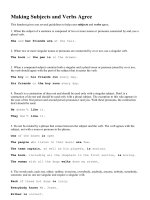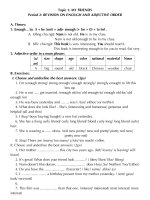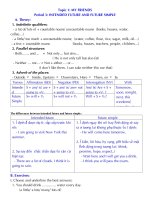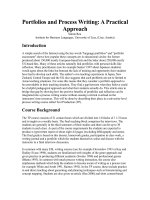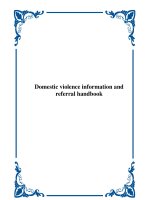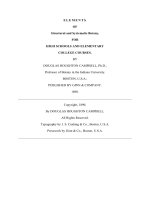Making Subjects and Verbs Agre1.doc
Bạn đang xem bản rút gọn của tài liệu. Xem và tải ngay bản đầy đủ của tài liệu tại đây (211.72 KB, 13 trang )
Making Subjects and Verbs Agree
This handout gives you several guidelines to help your subjects and verbs agree.
1. When the subject of a sentence is composed of two or more nouns or pronouns connected by and, use a
plural verb.
She and her friends are at the fair.
2. When two or more singular nouns or pronouns are connected by or or nor, use a singular verb.
The book or the pen is in the drawer.
3. When a compound subject contains both a singular and a plural noun or pronoun joined by or or nor, the
verb should agree with the part of the subject that is nearer the verb.
The boy or his friends run every day.
His friends or the boy runs every day.
4. Doesn't is a contraction of does not and should be used only with a singular subject. Don't is a contraction
of do not and should be used only with a plural subject. The exception to this rule appears in the case of the
first person and second person pronouns I and you. With these pronouns, the contraction don't should be
used.
He doesn't like it.
They don't like it.
5. Do not be misled by a phrase that comes between the subject and the verb. The verb agrees with the
subject, not with a noun or pronoun in the phrase.
One of the boxes is open
The people who listen to that music are few.
The team captain, as well as his players, is anxious.
The book, including all the chapters in the first section, is boring.
The woman with all the dogs walks down my street.
6. The words each, each one, either, neither, everyone, everybody, anybody, anyone, nobody, somebody,
someone, and no one are singular and require a singular verb.
Each of these hot dogs is juicy.
Everybody knows Mr. Jones.
Either is correct.
7. Nouns such as civics, mathematics, dollars, measles, and news require singular verbs.
The news is on at six.
Note: the word dollars is a special case. When talking about an amount of money, it requires a singular
verb, but when referring to the dollars themselves, a plural verb is required.
Five dollars is a lot of money.
Dollars are often used instead of rubles in Russia.
8. Nouns such as scissors, tweezers, trousers, and shears require plural verbs. (There are two parts to these
things.)
These scissors are dull.
Those trousers are made of wool.
9. In sentences beginning with there is or there are, the subject follows the verb. Since there is not the
subject, the verb agrees with what follows.
There are many questions.
There is a question.
10. Collective nouns are words that imply more than one person but that are considered singular and take a
singular verb, such as: group, team, committee, class, and family.
The team runs during practice.
The committee decides how to proceed.
The family has a long history.
My family has never been able to agree.
11. Expressions such as with, together with, including, accompanied by, in addition to, or as well do not
change the number of the subject. If the subject is singular, the verb is too.
The President, accompanied by his wife, is travelling to India.
All of the books, including yours, are in that boxDirections: Fill in the
blank with the appropriate article, a, an, or the, or leave the space blank if no article
is needed.
1. I want ____ apple from that basket.
2. ____ church on the corner is progressive.
3. Miss Lin speaks ____ Chinese.
4. I borrowed ____ pencil from your pile of pencils and pens.
5. One of the students said, "____ professor is late today."
6 Eli likes to play ____ volleyball.
7. I bought ____ umbrella to go out in the rain.
8. My daughter is learning to play ____ violin at her school.
9. Please give me ____ cake that is on the counter.
10. I lived on ____ Main Street when I first came to town.
11. Albany is the capital of ____ New York State.
12. My husband's family speaks ____ Polish.
13. ____ apple a day keeps the doctor away.
14. ____ ink in my pen is red.
15. Our neighbors have ____ cat and ____ dog.
Articles Exercise #1: Answer Key
Brought to you by the Purdue University Online Writing Lab
1. I want an apple from that basket.
2. The church on the corner is progressive.
3. Miss Lin speaks Chinese. (no article needed)
4. I borrowed a pencil from your pile of pencils and pens.
5. One of the students said, "The professor is late today."
6. Eli likes to play volleyball. (no article needed)
7. I bought an umbrella to go out in the rain.
8. My daughter is learning to play the violin at her school.
9. Please give me the cake that is on the counter.
10. I lived on Main Street when I first came to town. (no article needed)
11. Albany is the capital of New York State. (no article needed)
12. My husband's family speaks Polish. (no article needed)
13. An apple a day keeps the doctor away.
14. The ink in my pen is red.
15. Our neighbors have a cat and a dog.
Articles Exercise #2
Brought to you by the Purdue University Online Writing Lab
Directions: Write the following paragraphs, inserting a, an, and the where needed.
1. I have horse of my own. I call her Pretty Girl. She is intelligent animal, but she is not thoroughbred horse.
I could never enter her in race, even if I wanted to. But I do not want to. She is companion, for my own
pleasure. I took her swimming day or two ago.
2. Horse knows when he is going to race. How does he know? His breakfast was scanty. (He is angry about
that.) He does not have saddle on his back. He is being led, not ridden, to grandstand. He is led under
grandstand into unusual, special stall. Horse is nervous. Sometimes he does not know what to do when
starting gate flies open and track is before him. If he does not begin to run instantly, other horses are already
ahead of him. During race, when he sees another horse just ahead of him, he will try to pass him.
Sometimes jockey holds him back to save his energy for last stretch. Eventually horse gets to run as fast as
he can.
Exercise boy, watching owner's favorite jockey riding horse he has exercised day after day, says nothing.
Secretly, he is planning for day when he will be jockey himself, and his horse will be first to cross finish
line.
3. Most people have fewer hours to give to time-consuming activities of clubs than they used to have, but
most people in small town belong to club or two. One of clubs is likely to be social and benevolent
organization, such as Rotary or Elks. Business people are likely to belong, also to either Kiwanis Club or
Lions. Such business people's organizations may meet as often as once a week in one of private dining
rooms of town's leading hotel for lunch. They have good lunch, hear good program, and continue their
fundraising program for worthy organization, such as local hospital.
You can check your answers at
Articles Exercise #2 Answer Key
Brought to you by the Purdue University Online Writing Lab
1. I have a horse of my own. I call her Pretty Girl. She is an intelligent animal, but she is not a
thoroughbred horse. I could never enter her in a race, even if I wanted to. But I do not want to. She is a
companion, for my own pleasure. I took her swimming a day or two ago.
2. A horse knows when he is going to race. How does he know? His breakfast was scanty. (He is angry
about that.) He does not have a saddle on his back. He is being led, not ridden, to the grandstand. He is led
under the grandstand into an unusual, special stall. The horse is nervous. Sometimes he does not know
what to do when the starting gate flies open and the track is before him. If he does not begin to run
instantly, other horses are already ahead of him. During the race, when he sees another horse just ahead of
him, he will try to pass him. Sometimes the jockey holds him back to save his energy for the last stretch.
Eventually the horse gets to run as fast as he can. The exercise boy, watching the owner's favorite jockey
riding the horse he has exercised day after day, says nothing. Secretly, he is planning for the day when he
will be a jockey himself, and his horse will be the first to cross the finish line.
3. Most working people have fewer hours to give to time-consuming activities of clubs than they used to
have, but most people in a small town belong to a club or two. One of the clubs is likely to be a social and
benevolent organization, such as the Rotary or Elks. Business people are likely to belong, also to either the
Kiwanis Club or the Lions. Such business people's organizations may meet as often as once a week in one
of the private dining rooms of the town's leading hotel for lunch. They have a good lunch, hear a good
program, and continue their fundraising program for a worthy organization, such as a local hospital.
Making Subjects and Verbs Agree
This handout gives you several guidelines to help your subjects and verbs agree.
1. When the subject of a sentence is composed of two or more nouns or pronouns connected by and, use a
plural verb.
She and her friends are at the fair.
2. When two or more singular nouns or pronouns are connected by or or nor, use a singular verb.
The book or the pen is in the drawer.
3. When a compound subject contains both a singular and a plural noun or pronoun joined by or or nor, the
verb should agree with the part of the subject that is nearer the verb.
The boy or his friends run every day.
His friends or the boy runs every day.
4. Doesn't is a contraction of does not and should be used only with a singular subject. Don't is a contraction
of do not and should be used only with a plural subject. The exception to this rule appears in the case of the
first person and second person pronouns I and you. With these pronouns, the contraction don't should be
used.
He doesn't like it.
They don't like it.
5. Do not be misled by a phrase that comes between the subject and the verb. The verb agrees with the
subject, not with a noun or pronoun in the phrase.
One of the boxes is open

